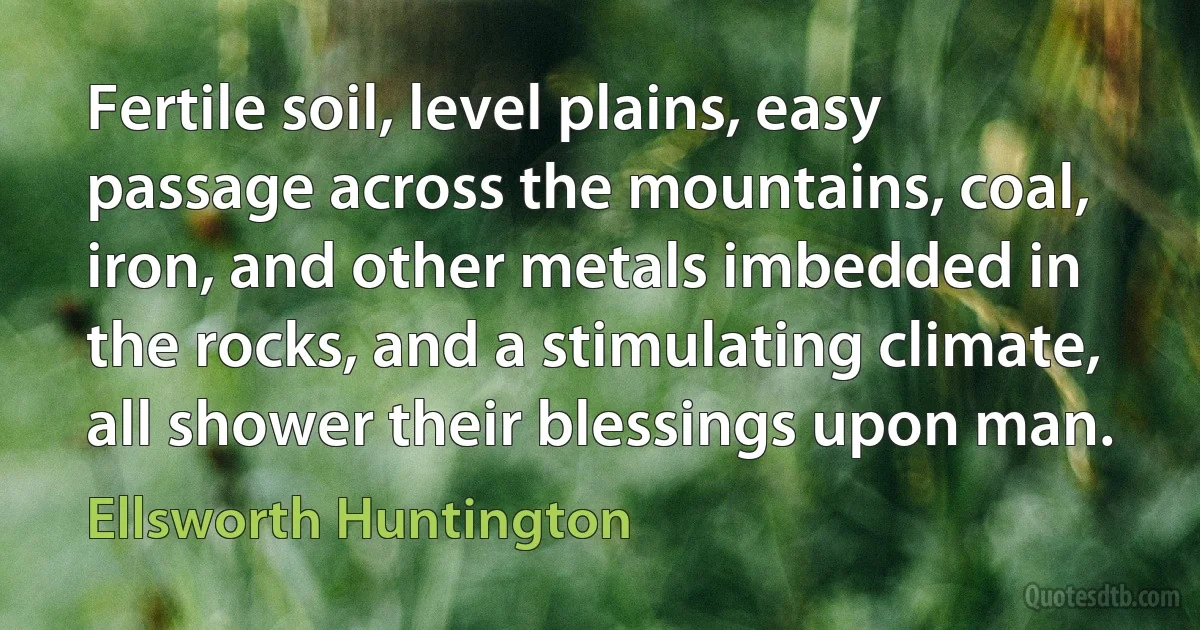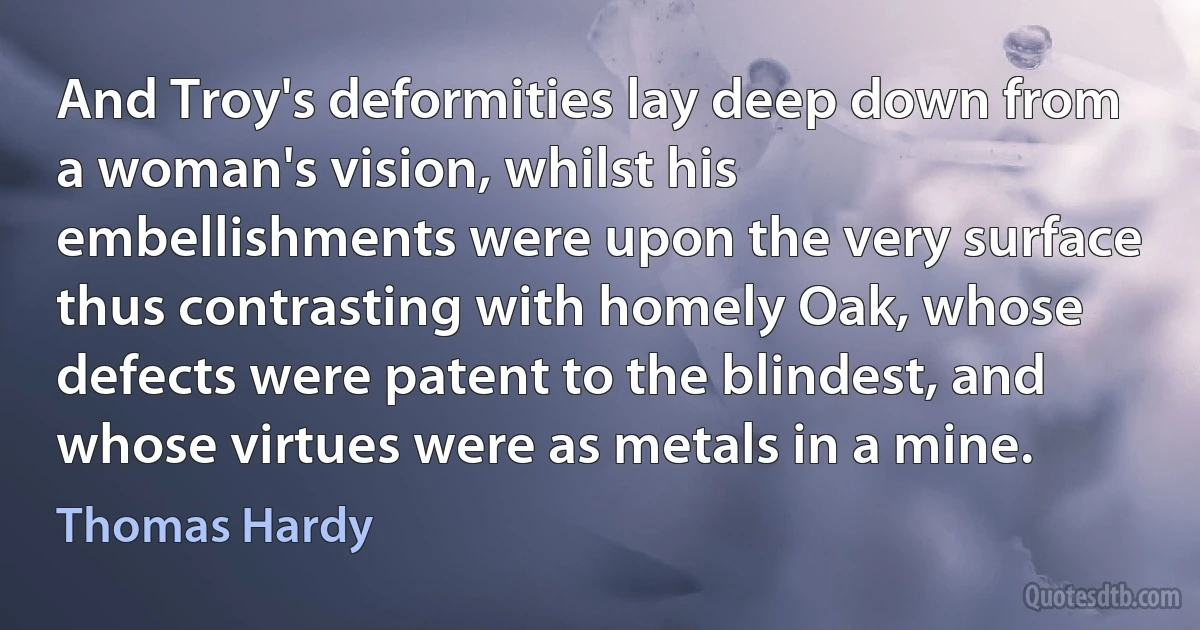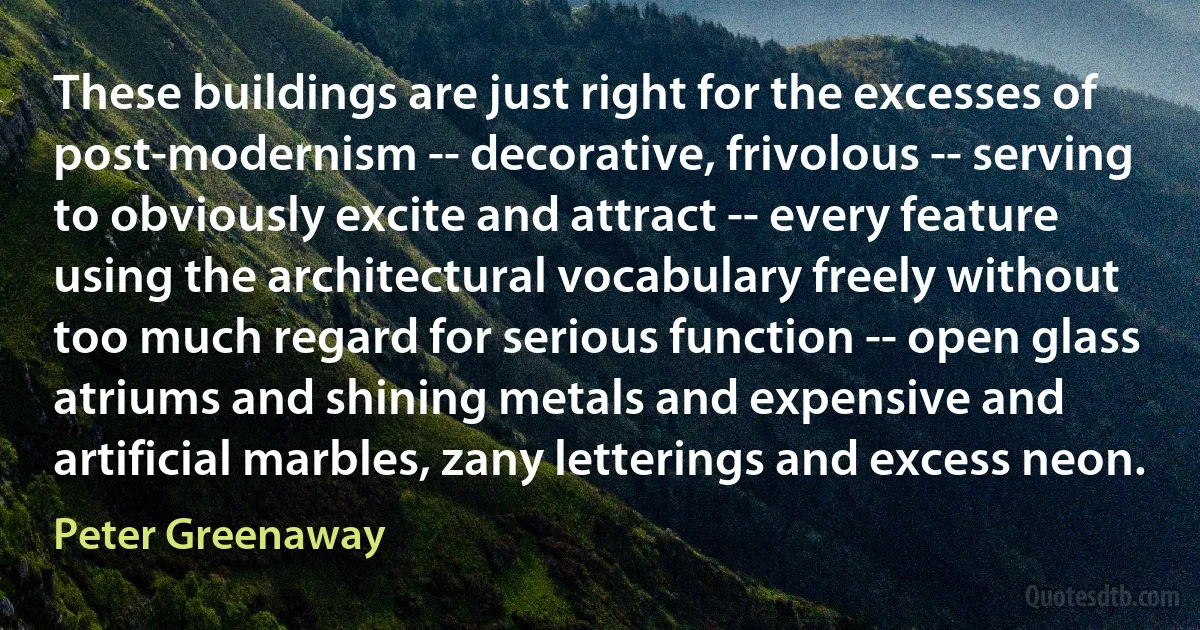Metals Quotes
The monopoly of a single bank is certainly an evil. The multiplication of them was intended to cure it; but it multiplied an influence of the same character with the first, and completed the supplanting the precious metals by a paper circulation. Between such parties the less we meddle the better.

Thomas Jefferson
That we are overdone with banking institutions which have banished the precious metals and substituted a more fluctuating and unsafe medium, that these have withdrawn capital from useful improvements and employments to nourish idleness, that the wars of the world have swollen our commerce beyond the wholesome limits of exchanging our own productions for our own wants, and that, for the emolument of a small proportion of our society who prefer these demoralizing pursuits to labors useful to the whole, the peace of the whole is endangered and all our present difficulties produced, are evils more easily to be deplored than remedied.

Thomas Jefferson
No single one can possess greater wisdom than the many scholars who are elected by all the men for their wisdom. Yet we can. We do. We have fought against saying it, but now it is said. We do not care. We forget all men, all laws and all things save our metals and our wires. So much is still to be learned! So long a road lies before us, and what care we if we must travel it alone!

Ayn Rand
The tidings I received concerning Hungary were horrifying. The looting, rape and violence that had followed upon the entry of the Red Army into Budapest surpassed the horrors with which we had grown familiar in reports from Vienna and Berlin. Neither small girls nor old women were spared. Cases were known of women in Russian uniforms knocking down men who would not do their bidding. Commando troops with special equipment searched for gold and other precious metals. In the banks, safes were broken open, and the contents, whether they belonged to Hungarians, foreigners or even allies, were looted. The pillage went on for weeks, and banks, business firms and private houses were searched time and time again. The Jews were treated no better than the rest of the population, who were picked off the streets and set to work.

Miklós Horthy
I went out into Downing Street a happy man. Of course it was partly because an old buffer like me enjoys feeling that he is still not quite out of things. But it was also pure patriotic joy that my country at such a time should have found such a leader. The furnace of war has smelted out all base metals from him.

Stanley Baldwin
Then, above all, the English people have a curious sense of humour, rather than wit. Humour comes from the heart; wit comes from the brain. We can laugh at ourselves. Do you remember what Ruskin said? "The English laugh is the purest and truest in the metals that can be minted," and indeed, only Heaven can know what the country owes to it. Well, laughter is one of the best things that God has given us, and with hearty laughter neither malice nor indecency can exist. And of all men who have shown us what that laughter can mean, none was like Dickens, every one of whose characters is English to the marrow; and if I might mention a living writer, I think the truest Englishmen are found in Mr. Priestley's novels.

Stanley Baldwin
The war was fought throughout and ultimately won, not only by the usual military weapons in the narrower sense, but by the whole economic, industrial, and financial systems of the belligerent Powers. Food, shipping, metals and raw materials, credit, transport, industries and factories of all kinds played just as important a part as guns, rifles, aeroplanes, tanks, explosives and gas, warships and submarines.

Jan Smuts
Fortunately, the less you have to rely on art materials – what are considered classic art materials which are all overpriced anyway – the more you can rely on materials at large in the culture and the more you should rely on them. The more free you are because you're not tied down to a higher-priced set of materials. That's the advantage of getting out in to the streets. I find that work I'm interested in now is made out of things which have been discarded by people – metals and things which I find in vacant lots. I don't want all of it. I want only certain kinds for certain purposes. But this is of interest to me now, just so I won't get into a trap where I have to work and continue with more and more expensive materials.

Carl Andre
It seems scarcely credible, that but little more than a century ago it was a matter of serious question with naturalists, whether the petrified shells imbedded in the rocks and strata were indeed shells that had been secreted by molluscous animals; or whether these bodies, together with the teeth, bones, leaves, wood, &c., found in a fossil state, were not formed by what was then termed the plastic power of the earth; in like manner as minerals, metals, and crystals.

Gideon Mantell
The general disposition of the land is one of metals in the west, giving way, as you travel eastward, to a varied landscape of nonmetals, which terminates in largely inert elements at the eastern shoreline. To the south of the mainland, there is an offshore island, which we shall call the Southern Island. It consists entirely of metals of subtly modulated personality. North of the mainland, situated rather like Iceland off the northwestern edge of Europe, lies a single, isolated region-hydrogen. This simple but gifted element is an essential outpost of the kingdom, for despite its simplicity it is rich in chemical personality. It is also the most abundant element in the universe and the fuel of the stars.

Peter Atkins
Paris remained Parisian in spite of change, mistress of herself though China fell. Scores of artists - sculptors and painters, poets and dramatists, workers in gems and metals, designers in stuffs and furniture - hundreds of chemists, physicists, even philosophers, philologists, physicians, and historians - were at work, a thousand times as actively as ever before, and the mass and originality of their product would have swamped any previous age, as it very nearly swamped its own; but the effect was one of chaos, and Adams stood as helpless before it as before the chaos of New York.

Henry Adams
The metals are all essentially identical; they differ only in form. Now, the form brings out accidental causes, which the experimenter must try to discover and remove, as far as possible. Accidental causes impede the regular union of sulphur and mercury; for every metal is a combination of sulphur and mercury. A diseased womb may give birth to a weakly, leprous child, although the seed was good; the same is true of the metals which are generated in the bowels of the earth, which is a womb for them; any cause whatever, or local trouble, may produce an imperfect metal. When pure sulphur comes in contact with pure mercury, after more or less time, and by the permanent action of nature, gold is produced.

Albertus Magnus
There is a beautiful tale among the Australian aborigines which says that the bow and arrow were not man's invention, but an ancestor God turned himself into a bow and his wife became the bowstring, for she constantly has her hands around his neck, as the bowstring embraces the bow. So the couple came down to earth and appeared to a man, revealing themselves as bow and bowstring, and from that the man understood how to construct a bow. The bow ancestor and his wife then disappeared again into a hole in the earth. So man, like an ape, only copied, but did not invent, the bow and arrow. And so the smiths originally, or so it seems from Eliade's rather plausible argument, did not feel that they had invented metallurgy; rather, they learned how to transform metals on the basis of understanding how God made the world.

Marie-Louise von Franz
There's an inherent limit to the stress that any material can bear. Water has its boiling point, metals their melting points. The elements of the spirit behave the same way. Happiness can reach a pitch so great that any further happiness can't be felt. Pain, despair, humiliation, disgust, and fear are no different. Once the vessel is full, the world can't add to it.

Stefan Zweig



